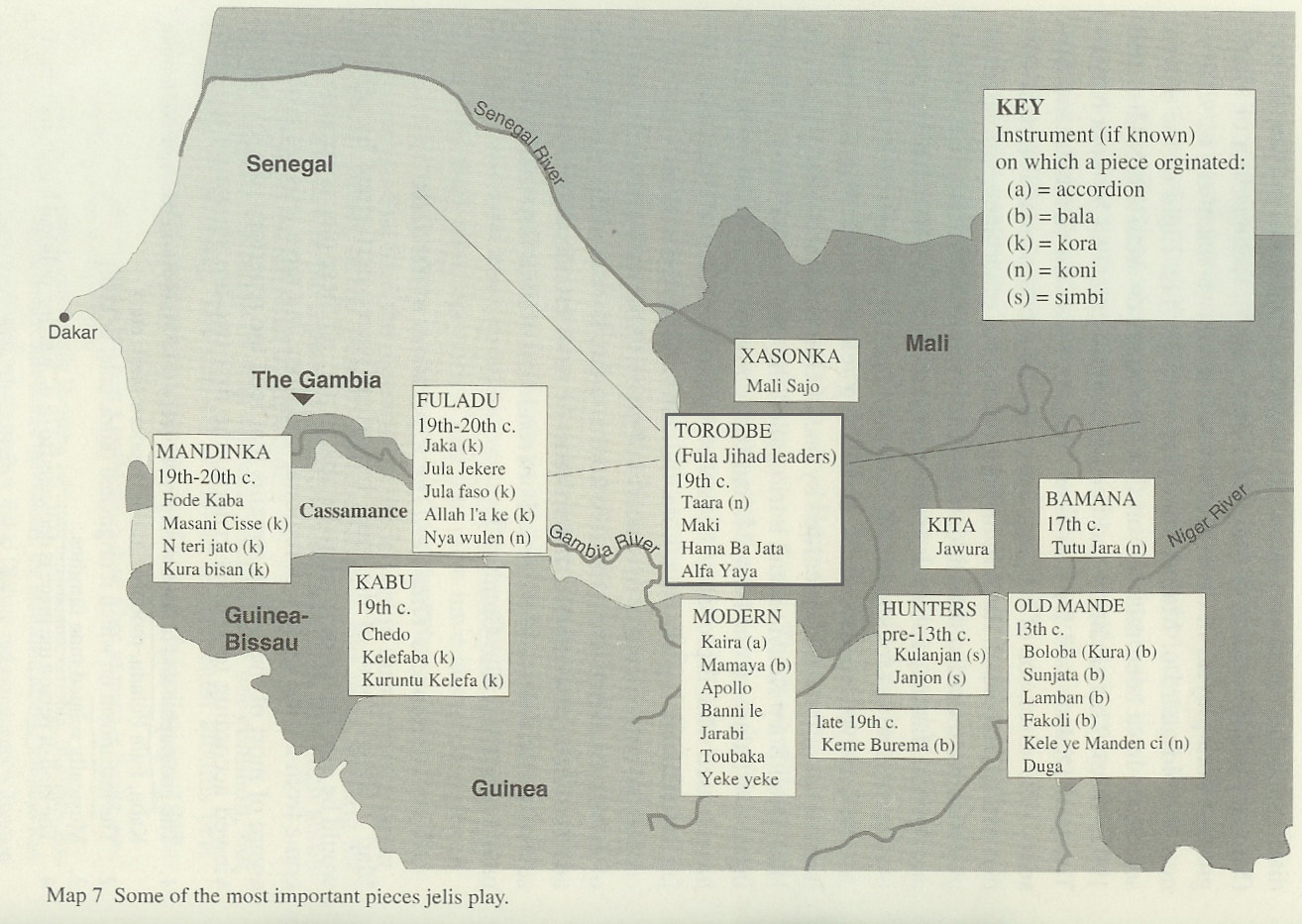alifa yaya
Charters, Samuel, prod. 1975a. African Journey: A Search for the Roots of the Blues. Vanguard, SRV 73014/5.
(Alfayaya / Alfa Ya Ya)
Alfa Ya Ya is a praise to a king of the Wollof.
Ya Ya, the great man,
Alfa Ya Ya was a great king, a king
and also a learned man.
Alfa Ya Ya - all kings are not the same.
The great tree fell and the birds scattered,
Alfa Ya Ya, all the people cry for you,
You were the best of all kings,
Alfa Ya Ya - kings are not the same.
Alfa Ya Ya, the king of kings,
Alfa Ya Ya, the kingdom of Futa will not forget you.
Alfa Ya Ya, it is because of trouble that people cry,
when we cry it is because something is wrong.
Alfa Ya Ya, the great tree is fallen - all the birds
have flown away. When Alfa Ya Ya dies his
followers scattered.
Alfa Ya Ya, kings are not the same.
Charters, Samuel, prod. 1975b. The Griots. Ministers of the Spoken Word. Folkways, FE 4178.
(Alifa Ya Ya)
Satala Kurubally plays and sings the first song, which was written for the great king Alifa Ya Ya, and is said to have been sung to wake him in the mornings.
Alifa Ya Ya, the great man.
Alifa Ya Ya was a great king.
He was a king and a learned man as well.
Alifa Ya Ya—all kings are not the same.
The great tree fell and the birds scattered away.
Alifa Ya Ya, all people cry for you.
You were the best of all kings.
Alifa Ya Ya, the kingdom of Fula will not forget you.
Alifa Ya Ya, it is because of trouble that people cry.
Whenever we cry it is because something is wrong.
Alifa Ya Ya, the great tree has fallen and all the birds fly away.
When Alifa Ya Ya died all his followers scattered.
Alifa Ya Ya—all kings are not the same.
Pevar, Marc, prod. 1978. Gambia's Music. Vol. 1. Folkways, FE 4521.
(Alifa Yaya)
. . . a song about a Mandinka hero, Alifa Yaya.
Knight, Roderic. 1982a. "Manding/Fula Relations as Reflected in the Manding Song Repertoire." African Music 6 (2): 37–47.
(Alifa Yaya)
p. 39
Table One . . . includes the best known, most often heard, or otherwise significant songs in the [Gambian] repertoire. In each column the top few songs are the oldest, and the bottom few are the youngest. The majority in each case fall somewhere in between (often in the nineteenth century), but no chronological ordering beyond this is intended, since it is often not possible to date a song exactly. Most of the songs bear the name of their owner as the title. Where they do not, his name is shown in parentheses next to the title. The letter code at the right represents the person's "claim to fame" or calling in life, as shown in the bottom of the list.
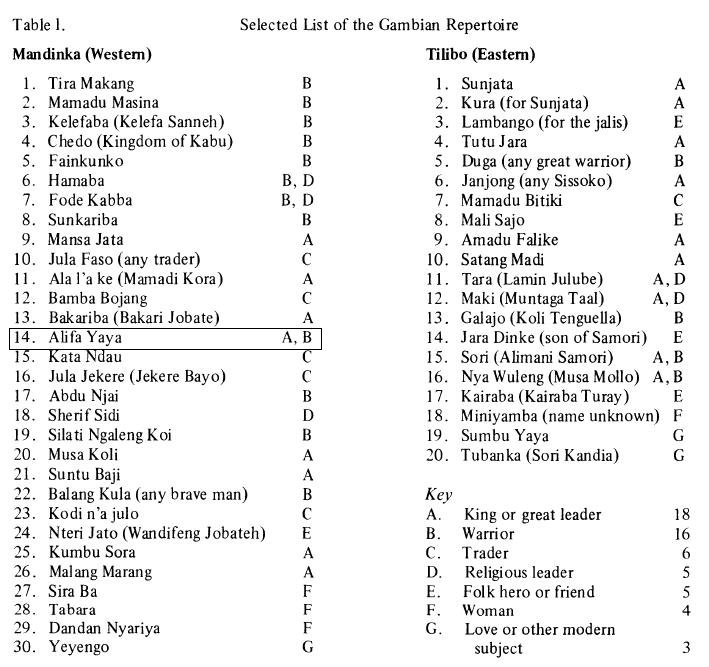
p. 40
Table Two shows the same fifty songs again, grouped this time by the ethnic background of the people commemorated.
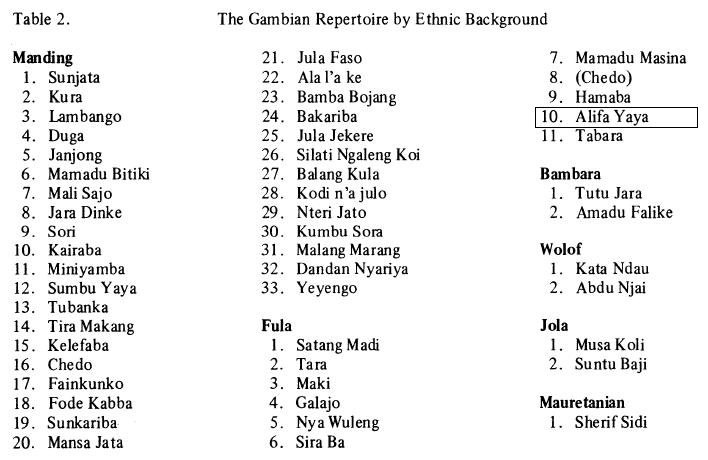
p. 45
The Fula king, Alifa Ibraima Jallow, in his conquest of Kabu, took the former wife of Janke Wali, the last king of Kabu, to be his own wife. Her name was Kumancho. The fruit of this union was Alifa Yaya, who became a leading figure in the fight against the French in the nineteenth century. He is commemorated in a Manding song that has become (with new words) the national anthem of Guinea today (See Example 4).
| Be mang kang, be mang kang | All are not equal, all are not equal |
| Alifa Yaya, mansolu be mang kang | Alifa Yaya, kings are not of equal ability |
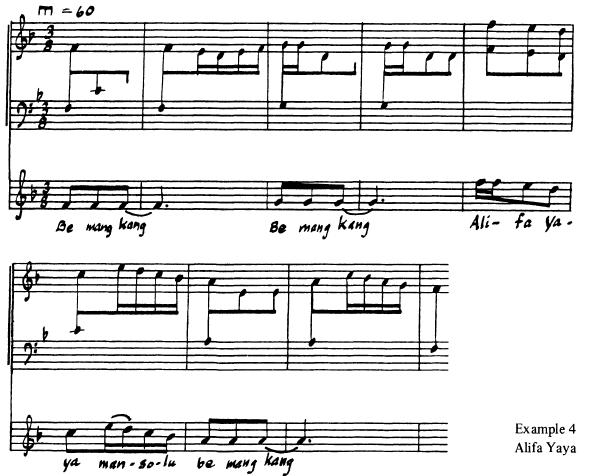
Coolen, Michael T. 1983. "The Wolof Xalam Tradition of the Senegambia." Ethnomusicology 27 (3): 477-498.
(Alfa Yaya)
p. 489
The largest proportion of traditional songs deals with the history and exploits of major leaders and warriors, such as Sunjata, founder of the Mali empire, and Alfa Yaya, the famous Fulbé warrior. Other songs deal with lesser-known historical figures. One such song is Tutu Jara, a story involving a king named Mansa Damanson, whose wife was unable to conceive children.
p. 491
There are also several examples of bi-partite fodets consisting of 24 beats. Alfa Yaya ( ex. 5) is a particularly interesting example of this kind of fodet. It is composed of four phrases, each consisting of two groups of three beats each.
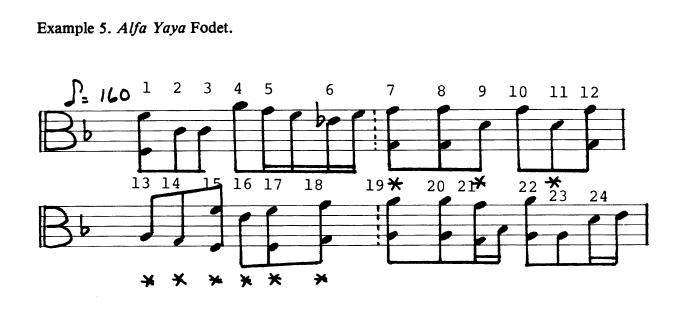
pp. 492-4
(See Coolen, 1983.) (Transcriptions and analysis.)
The song chosen for more detailed transcription and analysis is one of the best-known songs of the region; it was chosen by the Republic of Guinea as its national anthem. The title is Alfa Yaya, and it concerns the history, legends, and eventual demise of the famous Fulbé warrior by that name.
p. 497
8. Readers can hear an excellent version of Alfa Yaya played by Abdulai Samba on Volume 1 of African Journey: A Search for the Roots of the Blues (Sonet Records SNTF 666).
Jessup, Lynne. 1983. The Mandinka Balafon: An Introduction with Notation for Teaching. La Mesa, Calif.: Xylo.
(Alifa Yaaya)
pp. 146–59 (Appendix 2: Balafon Repertoire)
| Title | Alifa Yaaya |
| Translation: | Chief Yaya |
| Dedication: | Yaya Jalloh |
| Notes: | a Fula, often spelled Alfa Yaya |
| Calling in Life: | King or Leader, Warrior |
| Original Instrument: | Kontingo |
| Region of Origin: | Tilibo |
| Date of Origin: | M (19th & 20th c. up to WWII) |
| Sources: | 1, 3, 4 (Jessup & Sanyang, R. Knight 1973, R. Knight 1972) |
Knight, Roderic. 1984. "The Style of Mandinka Music: A Study in Extracting Theory from Practice." In Selected Reports in Ethnomusicology, vol. 5, Studies in African Music, ed. J. H. Kwabena Nketia and Jacqueline Cogdell Djedje, 3–66. Los Angeles: Program in Ethnomusicology, Department of Music, University of California.
(Alifa Yaya)
p. 8
The death of a great leader and its consequences are dealt with symbolically in the Tilibo song "Alifa Yaya" in which the jali sings "The great cotton tree has fallen; the birds have scattered from its branches."
pp. 24–25
There are a few pieces in the repertoire that are easily perceived as being in waltz time ("Masane Sise" and "Alifa Yaya"). Surely that feature (if not the melodies themselves) is a western importation, since waltz time is virtually unknown in traditional African music.
Jatta, Sidia. 1985. "Born Musicians: Traditional Music from The Gambia." In Repercussions: A Celebration of African-American Music, ed. Geoffrey Haydon and Dennis Marks, 14–29.
(Alifaa Yaayaa)
p. 23
Not all the pieces in the repertoire bear personal names as their titles, but most of them are named after the personalities for whom they were originally composed. Some examples of these are: FodeKabaa, Kelefaa, Saane, Saamoori, Alfaa Yaayaa, Mammadu Maasina, Satan Madi, Sirifu Siidi and Jula Jekere, all of which bear the names of historic figures.
Knight, Roderic. 1992. "Kora Music of the Mandinka: Source Material for World Musics." In African Musicology: Current Trends, ed. Jacqueline Cogdell DjeDje, 2:81–97. Los Angeles: African Studies Center, University of California.
(Alifa Yaya)
p. 83
Example 2a. The basic melody of Alifa Yaya, a traditional Mandinka song for Alifa Yaya Jalloh, a Fulani leader and Guinean hero. This tune served as the model for the Guinea national anthem. Translation: "All are not equal, Alifa Yaya, all kings are not equal" (i.e., You are greater than most).

Example 2b. The Guinea national anthem, based on Alifa Yaya. Note the duple meter, whereas the original (Example 2a) is in triple. From Shaw and Coleman, National Anthems of the World (1960). Reprinted by permission.
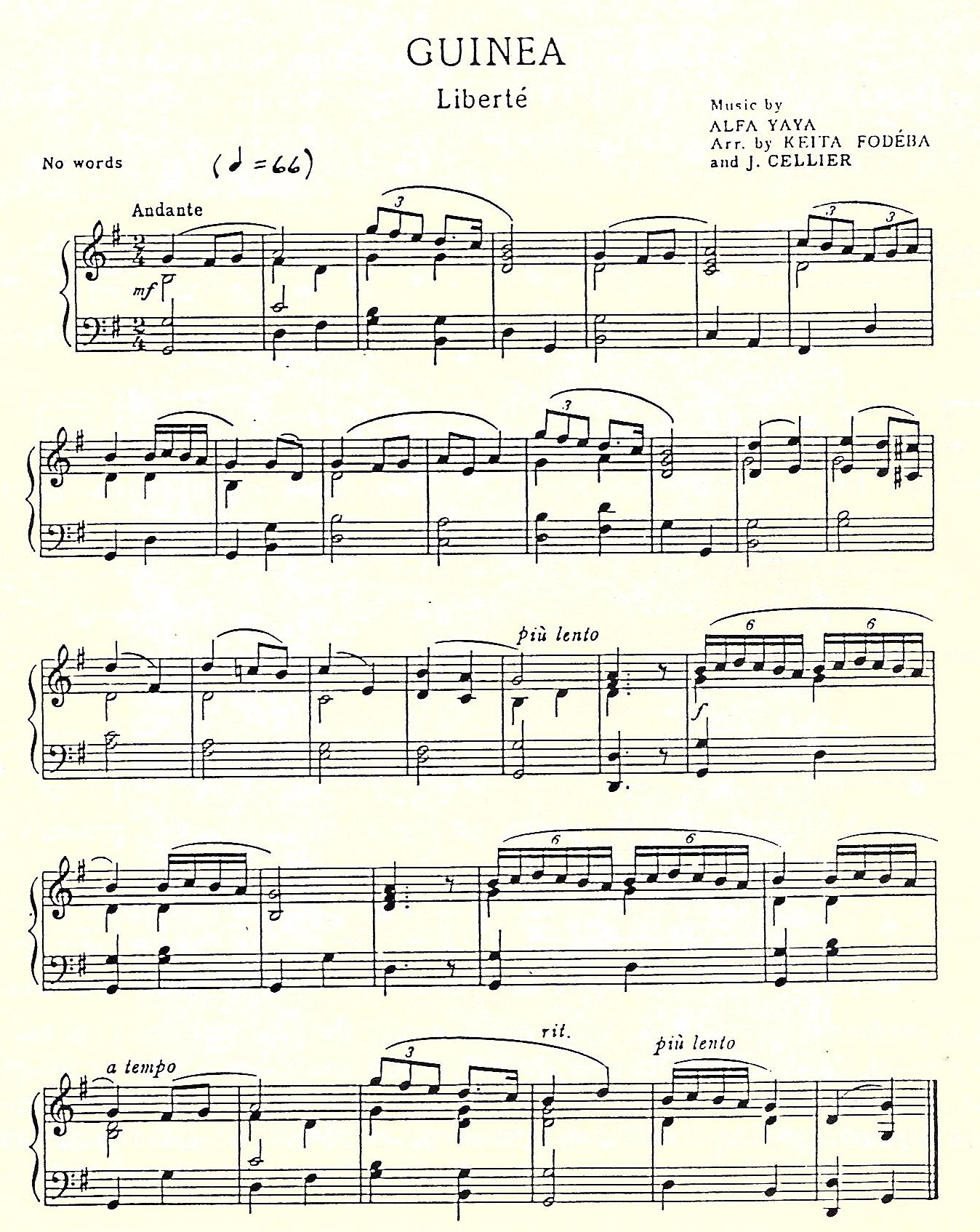
Jobarteh, Amadu Bansang. 1993. Tabara. Music of the World, CDT 129.
(Alfa Yaya)
Alfa Yaya is the national anthem of Guinea. This piece is dedicated to a great 19th century West African leader. The song, which probably did not originate on the kora, utilizes cascading bursts of birimintingo layered over a simple melody which is repeated over and over again.
Kaba, Mamadi. 1995. Anthologie de chants mandingues (Côte d'Ivoire, Guinée, Mali). Paris: Harmattan.
(Alpha Yaya1)
p. 213
Alpha Yaya, Alpha Yaya !
Ce sont les bienfaits
Qui font verser les larmes
Un véritable torrent de larmes.
Les larmes coulent, les larmes coulent.
Alpha Yaya, Alpha Yaya !
Ce grand arbre géant
Abattu violemment
Est tombé bruyamment
Et les nombreux oiseaux qui y nichaient
Se sont dispersé tout effarouchés.
Alpha Yaya, Alpha Yaya !
Ce sont les bienfaits
Qui font verser les larmes.
1 Alpha Yaya fut un ancien chef peul du Fouta et qui s'est rebell contre l'administration dès les débuts de la colonisation. Puisqu'il était largement obéi et soutenu par les populations, il a été condamné et est mort en exil. Ce morceau qui lui a été dédié et qu était joué sur la guitare traditionnelle évoquit les larmes qui coulent et tombent goutte à goutte. Il était enregistré sur des disques joués sur les phonoographes vers 1936. C'est la musique de ce chant qui devint l'hymne national guinéen. Ici, la colonisation est comparée à un vent violent qui a déraciné et abattu les chefs africains, laissant les populations étètées et désemarées. C'est l'un des premiers morceaux enregistrés sur disque au moment de l'usage des phonographes.
Suso, Jali Nyama. 1996. Gambie: L'art de la kora. Reissue of 1972 with other unreleased material. OCORA, C 580027.
(Alifa Yaya)
The song is for Yaya Diallo, "Alifa" being a title. Diallo was a king of the Fula people of Guinea, and a version of this song, like Nyama’s "Foday Kabba", forms the national anthem of Guinea. Diallo was a contemporary of Samori Touré, and the song was actually composed by Samori’s jali, a kontingo player named Morifing Diabaté. The song reveals little about the life achievements of Yaya Diallo, but praises his greatness with the words, Bee mang kang... "Not all are alike, Alifa Yaya, not all kings are one." Another line begins Nyaji bo... "It brings tears, to lose the benefits we’ve known." The most memorable line is I janjata, konolu janjata. Yiribaa boita le, konolu janjata, which means "They have scattered, the birds. A great tree has fallen, the birds have scattered."
"Alifa Yaya" is in waltz time, unusual in Africa, leading one to wonder about the ultimate origin of the tune. The tuning is hardino.
Charry, Eric. 2000. Mande Music: Traditional and Modern Music of the Maninka and Mandinka of Western Africa. Chicago; London: University of Chicago Press.
(Alfa Yaya)
p. 148
